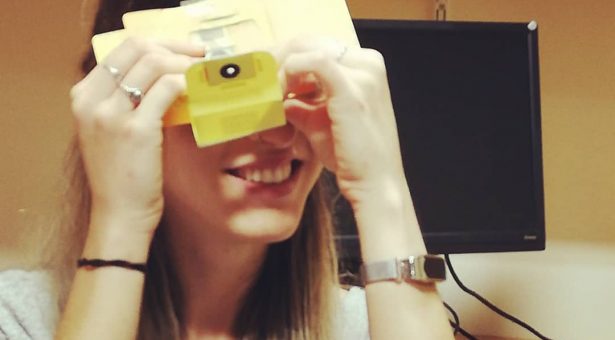British Neuroscience Association provides Estela with an excellent placement

Estela Perez Santamarina, a DTP student at the University of East Anglia, wanted to undertake an internship that related to the wider field of her PhD (Neuroscience research) and was keen to use the opportunity to develop her science communication skills aimed at non-academic audiences. After doing some research in to various organisations that might be able to offer her an internship, Estela contacted the British Neuroscience Association (BNA) in Bristol and arranged to do her placement with them. The BNA is a professional membership society representing the neuroscience community in the UK, covering all aspects of the science of the brain and nervous system. The BNA’s activities include membership management, holding events, running a scientific journal, advocating for neuroscientists, educational work, and representing the UK at European and global levels.
The BNA was keen to have an intern develop science education materials for use in primary and secondary education, but there was flexibility for Estela to pursue her own ideas for subject content, as well as align with National Curriculum. One of the roles was creating engaging activities to explain complex neuroscience topics. Estela found it quite challenging at first to come up with creative ideas for demonstrations that could be carried out in school lessons and aiming the written content at an appropriate level i.e. not use jargon. However constructive feedback from her manager and support from related organisations (Understanding Animal Research) was useful in tailoring content appropriately. Estela developed several different educational packages related to neuroscience that are in the process of being trialled in schools before being made publicly available via the BNA website. Estela’s other duties during the placement involved updating news and jobs on the BNA internet pages (https://www.bna.org.uk/).
In addition to improving her communication skills, Estela gained lots of other skills as a result of her internship. Her time management skills were improved, and she felt she managed her 3 months well to finish all the projects she was involved in. Estela was also invited to attend additional meetings with her manager, one of which was discussing the future strategy and focus of the BNA, so giving Estela good insight into how small professional bodies operate.
In terms of her career, Estela has learned that she can do many different things using her science background outside the academic field and it has opened her view of jobs outside academia. During the placement Estela’s line manager put her in contact with some people working in related fields in consultancy and science policy, to give a flavour of the wider career options related to neuroscience.
Overall Estela found the placement experience to be a very positive one and encourages future PIPS students to look for a placement in an area that is outside of your comfort zone. Estela feels the internship was a welcome break from her PhD research, undertaking the placement during her third year. She has returned with renewed focus to complete her experimental work and start writing up her thesis and feels more confident about her science communication ability.
